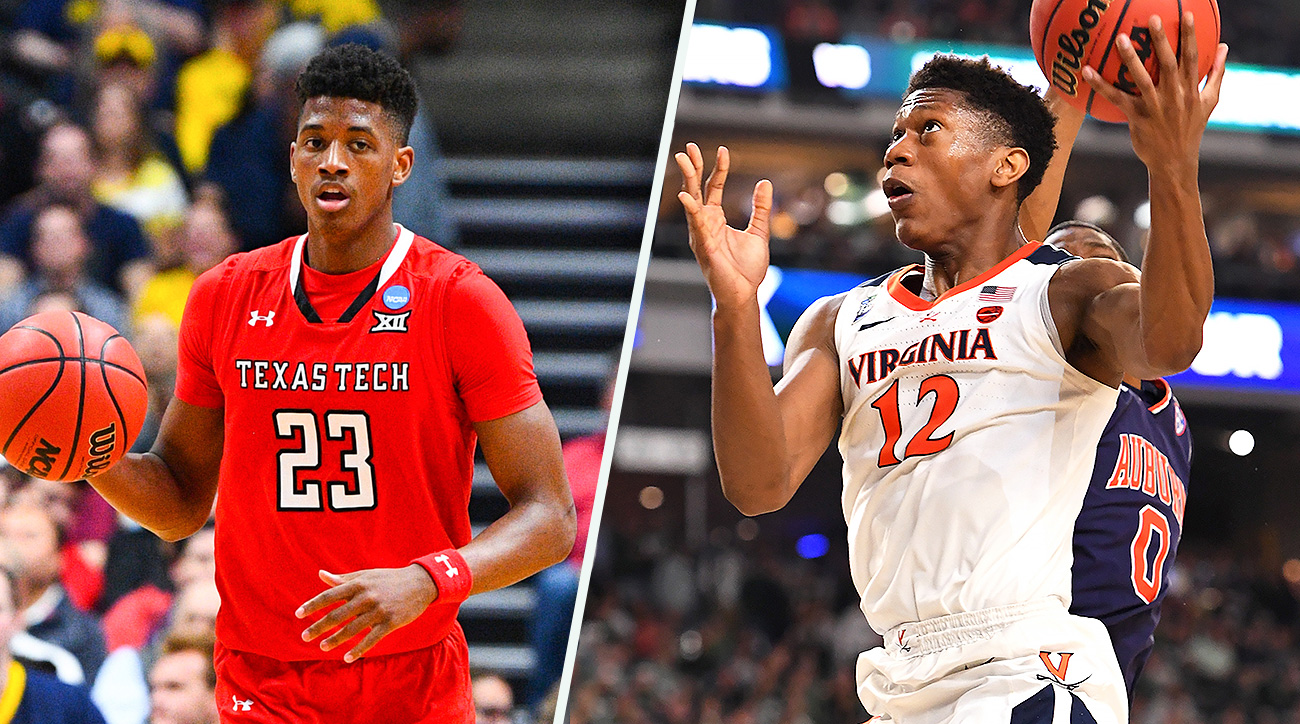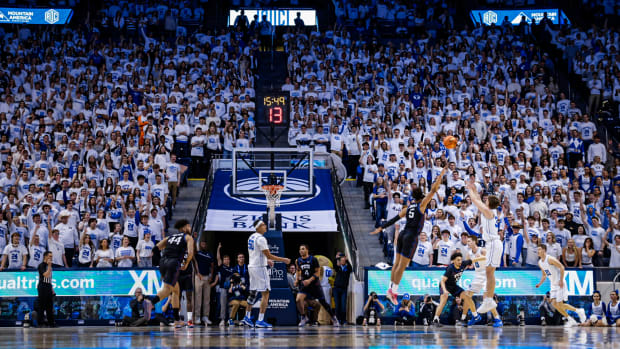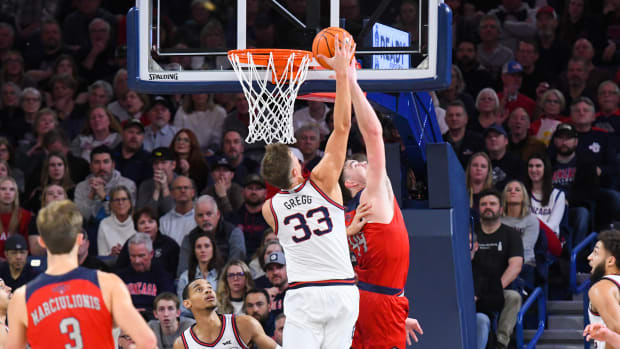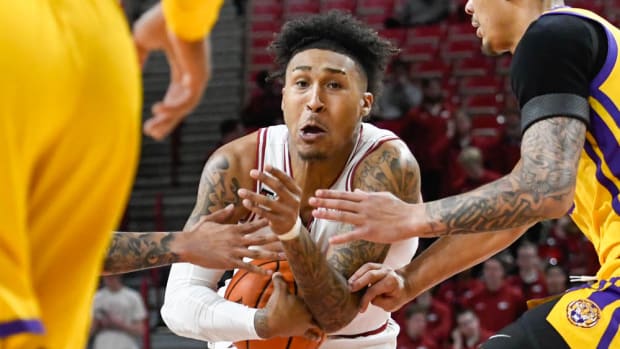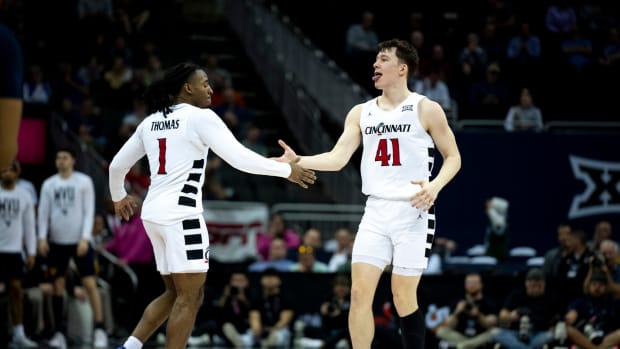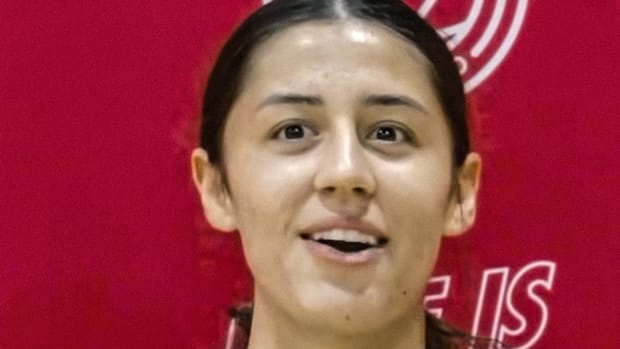The Players, Matchups and Stories That Will Decide Virginia–Texas Tech
In a matter of hours, the 2019 men's national champion will be crowned, and we're guaranteed to get a first-time winner. Will it be Tony Bennett and Virginia, completing a redemption story after 2018's historic loss? Or will it be Texas Tech, fulfilling its quick and impressive program rise under Chris Beard? Our championship game expert picks, with explanations, can be found here, and our Xs and Os preview is here. Below, our writers predict how some of the top narratives heading into Monday night will determine the outcome.
Who is the most important defender on the floor?
Dan Greene: Tariq Owens, which means the status of the ankle he rolled against Michigan State will be something to monitor. Owens is a long 6'10" shot-blocker who can switch onto perimeter players and be a disruptive menace inside; his versatility is a major component of Texas Tech's stellar D.
Jeremy Woo: Tariq Owens. If he’s fully healthy, he’s the key to walling off the paint. If he’s not, Texas Tech’s final line of defense could be hamstrung, leaving extra room for Virginia to operate. When you’re all in on high ball pressure for 40 minutes, there’s extra responsibility on whoever’s down low to cover ground and take care of business
Michael Beller: I think that Texas Tech will need a huge offensive effort from Jarrett Culver to win this one, so I’ll say De’Andre Hunter. He should draw primary duty on Culver, and if he can keep him in check the Red Raiders’ offense will be in a lot of trouble.
Molly Geary: Whoever guards Matt Mooney, which I’m assuming may be Ty Jerome. Jarrett Culver, De’Andre Hunter, Kyle Guy and Jerome are all huge keys to the game, obviously, but Texas Tech needs a secondary guy to Culver (or a lead one, if the sophomore has another slow start), and Mooney is the best bet to be that guy. He can get hot from three, like when he made 4 of 8 from deep to sink Michigan State, and he went a combined 9 for 16 from inside the arc against the Spartans and Gonzaga (and dished out five assists in the latter). If Mooney is limited, it’s going to put a ton of pressure on Culver and the Red Raiders’ role players.
Emily Caron: Matt Mooney. Mooney will likely draw either Ty Jerome or Kyle Guy—Virginia's best scorers. If you want to beat a team that's used those two sharp shooters so heavily to survive and advance in these later rounds, as Tony Bennett talked about Saturday night, you'll need someone to stop one of the two. Mooney will have to lockdown on whichever talented guard he has to defend. How they handle those two could be a game-changer for Texas Tech.
Michael Shapiro: Can Tariq Owens hold his own in space? We’ve discussed the St. John’s transfer’s rim protection at length, but his ability to defend on the perimeter is critical for the Red Raiders. Expect Virginia’s guards to manufacture a potential mismatch, drawing Tech’s primary rim protector away from the rim. Owens will need to stay on his feet and out of foul trouble for the national title to land in Lubbock.
Max Meyer: Norense Odiase. Tariq Owens got hurt in Texas Tech’s win over Michigan State, and who knows how healthy he’ll be on Monday night. Owens is Tech’s best interior defender, and if he’s not 100%, the Red Raiders will need the 6’8” senior Odiase to step up on that front. Virginia has been vulnerable against stout two-point defenses in Oregon (Hoos shot 47.8% on twos) and Purdue (47.4%), as tight games occurred in part due to a drop-off from its two-point shooting (52.7% on the season).
Eric Single: Tariq Owens is the rare imposing shot blocker who is also incredibly comfortable defending near the three-point line, as his controversial block/"inbounds" save at the end of the win over Gonzaga proved. Mamadi Diakite has thrived in a similarly versatile role for Virginia, but if Owens is healthy and locked in, Virginia's shooters could find themselves in tough spots.
Which starter can Virginia least afford a bad night by?
Greene: De'Andre Hunter. He is the Cavalier best able to combat the length and athleticism of Texas Tech's defense, so him being effective and assertive will be key.
Woo: De’Andre Hunter. Ty Jerome and Kyle Guy are going to take the same shots, and be a threat to make those shots no matter what. They have to be accounted for. When Hunter is aggressive, taking good shots and has his jumper falling, it’s a pivotal third offensive dimension. When he’s floating around and can’t get into the gameflow, UVA’s margin for error is slim, particularly against a team as defensively staunch as Texas Tech. Hunter is also going to see a lot of time on Jarrett Culver. He’s going to have to be up to task.
Beller: Kyle Guy, and it isn’t close. We all saw what happened when he went just 2 for 6 from behind the three-point arc against Auburn. When he doesn’t shoot it well, Virginia’s offense stalls.
Geary: De’Andre Hunter. The shooting ability of Kyle Guy and Ty Jerome can be counter-acted by Texas Tech, but Hunter’s ability to drive and attack will be pivotal to Virginia’s offense and beating the Red Raiders' D. Hunter has been hot and cold this tournament, and the Hoos need him to be aggressive. He’s also likely to draw a crucial defensive assignment on Jarrett Culver.
Caron: De'Andre Hunter, again. Hunter will be crucial to breaking down Texas Tech's defense (and stopping Jarrett Culver) and he's going to be needed for points in the paint. He had a slow start in the first half of Virginia's Final Four game against Auburn, but as we saw in the second half—when Hunter comes out strong, he can turn the tide for the Cavaliers.
Shapiro: The Cavaliers’ championship hopes don’t hinge on a single starter, but I think Kyle Guy needs a strong night to take home the title. The diminutive point guard must avoid turning it over against Texas Tech’s swarming defense, and a few early threes could springboard the Cavaliers to victory. Even amid a balanced attack, Guy remains the engine in Charlottesville.
Meyer: Ty Jerome. Kyle Guy and De’Andre Hunter have been inconsistent offensively of late, but Jerome has been a force. He’s averaging 16.6 ppg in the NCAA tournament and has hit several big-time outside shots.
Single: Ty Jerome. In addition to being the Cavaliers' leading scorer this tournament (averaging 16.6 points per game), Jerome has the most reliable hands on the defensive end of the floor. Virginia lags way behind Texas Tech in turnover generation, but it needs to create some havoc and force Texas Tech to spend precious time worrying about ball security to tip the scales.
Is an elite defensive matchup a good or bad thing for college basketball?
Greene: A good game is what matters most, especially if it's close and dramatic late. Something like the UConn-Butler slog from 2011 would be bad and, given the nature of these two teams, be taken by many as confirmation of some criticisms of the sport. But—controversy aside—Virginia and Auburn just showed us how compelling a relatively low-scoring matchup can be if it unfolds dramatically.
Woo: Neither, it’s just an aesthetic. Just like a close game and a good game are not always one and the same, a defensive-oriented game can take many forms. This might be ugly, but we’ll get over it if the last five minutes are memorable.
Beller: Neither. It just is. These two teams getting to the final isn’t some grand commentary on college basketball today and where it’s headed. It’s just the result of two great teams navigating the challenging, somewhat random road presented in a 68-team, single-elimination tournament. We’re a couple made baskets and a correctly officiated double-dribble call away from this being Gonzaga vs. Auburn, which would likely be an elite offensive matchup. Enjoy this game for the unique matchup that it is.
Geary: If the game winds up as low scoring as anticipated, I think the negatives outweigh potential positives unless it ends in truly thrilling fashion or controversy. A defensive battle isn't the worst thing in the world, and I think most dedicated college hoops fans are excited for the complexities of this matchup, but it’s not a brand of basketball that’s going to appeal to the casual fan. Expect a lot of lamenting and moaning on Twitter on Monday night—or perhaps just indifference outside the college basketball bubble.
Caron: I think it's a good thing. It's good to show that the state of college basketball isn't static but it also shows that the sport isn't entirely dependent on all the wildly talented offensive players that go on to be one-and-done's.
Shapiro: Texas Tech and Virginia will bring a close battle and potentially some final-minute drama. For the most invested fans, Monday will be a real treat. Yet for the sport by and large, such a low scoring final is probably less than ideal. The casual fan is more likely to enjoy an up-tempo affair with a pair of brand-name programs. The 2019 final is at risk of being forgotten in the next decade.
Meyer: Texas Tech has the best defensive efficiency in the KenPom era (since 2002), and it’s a different type of excellence that still deserves to be celebrated. It may not be as exciting as a battle between two fast-paced perimeter-oriented teams, but it will be just as fascinating to watch this chess match between two elite defenses and two elite coaches.
Single: It's a bad thing. This is going to be an extremely well-played game, but it's too much for college basketball nuts to ask that casual fans tuning in for the national championship appreciate how these teams carved out historic runs in a season where elite offenses drew headlines all year, from Zion & Co. to the Zags.
Will the team that shoots better from three win the game?
Greene: Yes. Virginia is one of the very best in the country in that department, but Texas Tech is pretty good too, so exactly which team fares better from deep is hard to peg. But doing so will go a long way in deciding a low-possession, defensively controlled game.
Woo: Yes. Great looks are going to be especially hard to come by, and whoever converts will benefit.
Beller: We’re at a point on the basketball timeline where even teams that aren’t dependent on the three-point shot are hoisting 10-plus shots from distance per game. It’s a necessary element of every offense. Yes, whichever team that shoots better from three will win.
Geary: The Auburn game was actually the first time Virginia won the three-point battle all NCAA tournament. I think either team can win without shooting better from deep, but in this case, my pick is for Texas Tech to win the battle from the outside—and the game.
Caron: Yes. Both defenses intentionally limit points in the paint so the perimeter could easily be where this game is decided.
Shapiro: Not necessarily. Texas Tech is averaging just seven made threes per game in the tournament at 35.7% from beyond the arc. Virginia is shooting 31% from three. Don’t expect the three-point line to determine the champion on Monday night.
Meyer: Not necessarily, but I think it’s more important for Texas Tech to win the three-point battle in this one because of how tough it will be to get easy looks inside against Virginia’s Pack Line. And while Virginia is an elite three-point shooting team (39.3%, ninth in CBB), the Hoos don’t shoot it that often from beyond the arc (152nd in three-point attempt rate).
Single: Yes. By nature of both offenses' patience alone, enough possessions end in three-point looks with the shot clock winding down that this one should be all about how many of those shots actually fall.
Who will win Final Four Most Outstanding Player?
Greene: Matt Mooney. Texas Tech is my pick to win and he's got a leg up on everyone with his 22-point showing on Saturday, so he's got to be the frontrunner among Red Raiders.
Woo: Ty Jerome.
Beller: Kyle Guy already has the great narrative going after his free throws from the Final Four win over Auburn. A merely solid game in a winning effort will give him the MOP, and I think he’ll have much better than a merely solid game.
Geary: Matt Mooney. Culver may have a better national championship game, but I think Mooney does enough to pair with his 22 points in the semifinal and be name MOP.
Caron: Kyle Guy would be the obvious answer after Saturday's heroics, but Ty Jerome has been the most important player to Virginia's run. His impressive performances in both the Elite Eight and Final Four were overshadowed by last-minute miracles but his facilitating has been fantastic and his scoring essential.
Shapiro: Jarrett Culver. The future lottery pick slumped his way to a 3 for 12 performance against Michigan State, but expect his One Shining Moment to come on Monday night. Matt Mooney has the inside track right now, though I think the Cavaliers will devote plenty of energy to limiting the Red Raiders from three. Mooney’s impact could be muted while Culver shines inside the arc.
Meyer: Jerome. Guy and Hunter have each had big moments, but Jerome has been the most consistent and I think he’s going to have a big game against Texas Tech.
Single: Matt Mooney. His sterling night against Michigan State put on national display how much he personifies what the Red Raiders are about. If he outscraps Guy, Jerome and Kihei Clark, he will become the poster boy for this weird year of college basketball: a grad transfer who hits threes and works tirelessly in his own end.
Who's most likely to be an unexpected hero?
Greene: Braxton Key. The Alabama transfer has played just 19 minutes over the Cavaliers' last three games, but he has seen extended floor time against tough opponents before and is a strong rebounder on both ends. He could grab a defensive board or convert a put-back in a pivotal moment Monday.
Woo: This question is an oxymoron and I’m picking Jack Salt.
Beller: Kyler Edwards is going to get a lot of run because of the matchups in Virginia’s backcourt, and he can get hot from behind the arc. He’d play a big role in a Texas Tech win.
Geary: For Texas Tech, Davide Moretti. He shoots 45.8% from three on the season but was largely quiet against Michigan State. He should get looks from deep against the Pack Line. For Virginia, Kihei Clark. That kid just always seems to surprise, in a good way.
Caron: Braxton Key. Hunter will need some help setting screens against Texas Tech's defense if Virginia wants to get things going offensively and that's where Key comes in. Add in that the Cavaliers will need his help big time at the boards and this could be his time to shine.
Shapiro: Davide Moretti’s impact has been muted in the tournament despite shooting 45.8% from three in 2018–19. In such a low-scoring affair, a few clutch threes could swing the title.
Meyer: Mamadi Diakite hit arguably the biggest shot in Virginia basketball history, yet there may be more clutch heroics in store. He’s had nine blocks in Virginia’s wins over Purdue and Auburn, and I think his shot-blocking prowess could be critical here again. Diakite has also scored at least 14 points in three of the five tournament games (he's averaging 7.4 ppg on the season), and if he can have an impact on the offensive end, that would be an enormous plus for the Hoos.
Single: Kihei Clark is in the midst of what qualifies for him as an offensive tear: The last five-game stretch in which the diminutive guard scored as many points as he has so far in the tournament was in November. Clark has picked his spots well and has been knocking down open looks; it will no longer be a surprise to see him make his presence felt on the offensive end.
Finally, give your score prediction
Greene: Texas Tech 59, Virginia 56.
Woo: 65–60, Virginia.
Beller: There’s going to be a bit more offense in this one than people expect. Both of these teams may play at a slow pace but they’re efficient, and there will be five guys who shoot it at 40% or better from three-point land on the floor for at least 30 minutes apiece. Give me Virginia, 71–66.
Geary: Texas Tech 64, Virginia 59
Caron: 63–61, Virginia.
Shapiro: Texas Tech 61, Virginia 57
Meyer: Virginia 58, Texas Tech 53
Single: 58–54, Texas Tech. The Red Raiders ultimately have a deeper well of shotmakers to draw from, and all it should take is one little seven-point run to get sufficient separation.
